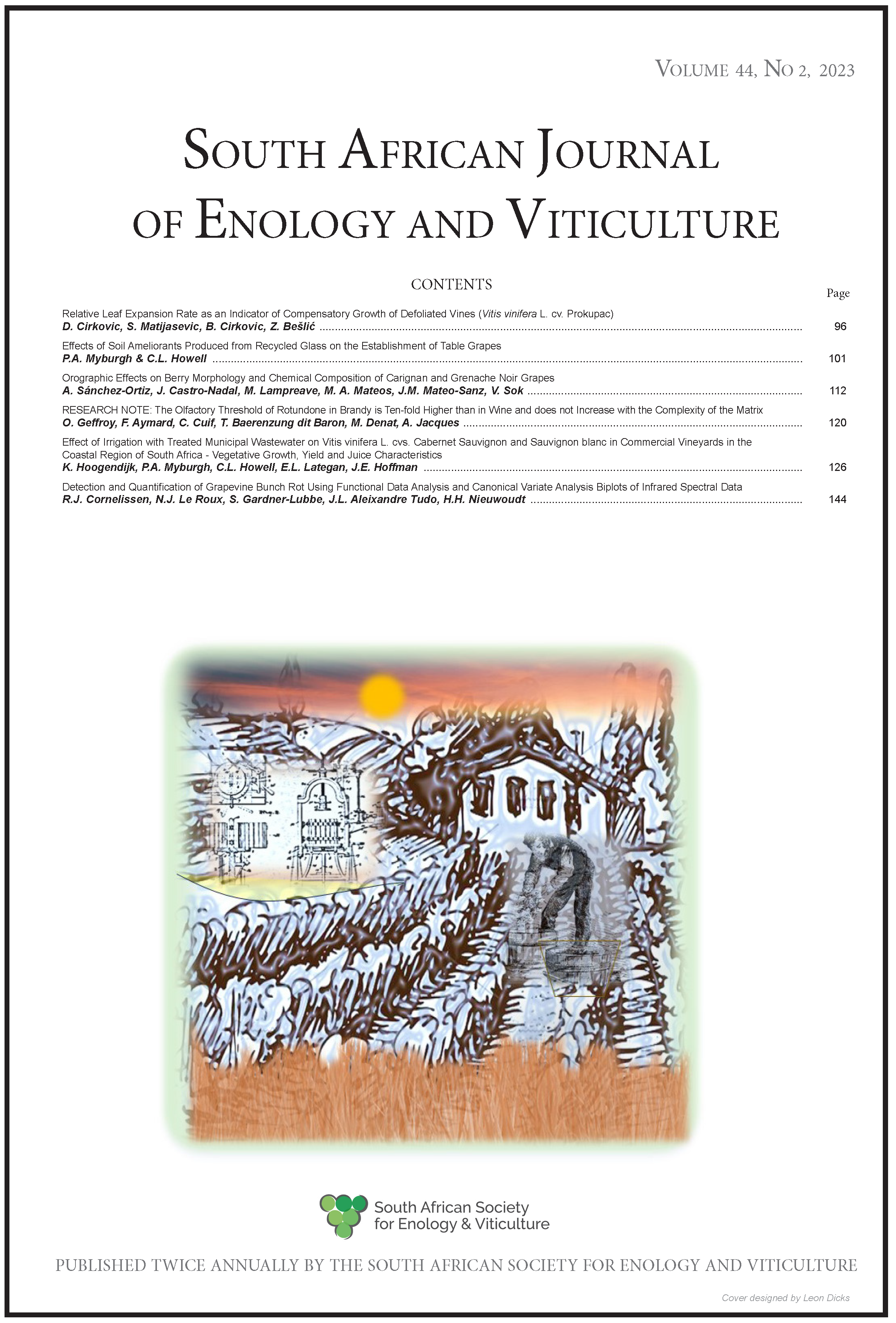Effects of Soil Ameliorants Produced from Recycled Glass on the Establishment of Table Grapes
DOI:
https://doi.org/10.21548/44-2-5664Abstract
Sandy, gravelly or stony soils with low nutrient supply or plant available water are common in the table
grape growing regions of South Africa. A field study was carried out to determine if an ameliorant recycled
from waste glass could enhance the nutrient and water supply during the establishing phase of table
grapes. Two grades of ameliorant, i.e. fine and coarse, were incorporated into the soil before the grapevines
were planted. No ameliorants were applied to the control. After planting, the grapevines were irrigated
by using 2.1 L/h drippers. To establish whether the ameliorants could compensate if less water is applied,
the same treatments were applied under 1.2 L/h drippers. In general, the grapevines responded positively
to the higher irrigation volumes, irrespective of ameliorant application. Where higher irrigation volumes
were applied, the ameliorants did not have any positive effect on soil chemical or grapevine nutrient
status compared to the control. This showed that the ameliorants were chemically inert under the given
conditions. The ameliorants also did not improve grapevine water status, vegetative growth, yield or juice
characteristics. Likewise, the ameliorants could not compensate for any measured aspect of grapevine
performance where less irrigation was applied. In general, the ameliorants did not meet the expectations.
Considering the additional costs of the ameliorant application, and the lack of positive grapevine responses,
this practice cannot be justified under the given, or comparable conditions.
Downloads
Downloads
Published
How to Cite
Issue
Section
License
A copyright form will be e-mailed to the corresponding author when the manuscript has been accepted for publication.
In principle, the Author agrees to the following when he/she signes the copyright agreement:
I hereby assign to the SOUTH AFRICAN SOCIETY FOR ENOLOGY AND VITICULTURE (SASEV) the copyright of the text, tables, figures, supplementary material, illustrations and other information (the Material) submitted with the manuscript to be published in SOUTH AFRICAN JOURNAL OF ENOLOGY AND VITICULTURE (SAJEV) (the "Article"). The copyright becomes effective from the date the Article has been accepted for publication in SAJEV.
This is an open access journal, and the authors and journal should be properly acknowledged, when works are cited.
Author's may use the publishers version for teaching purposes, in books, theses, dissertations, conferences and conference papers.
A copy of the authors' publishers version may also be hosted on the following websites:
- Non-commercial personal webpage or blog.
- Institutional webpage.
- Authors Institutional Repository.
The following notice should accompany such a posting on the website: This is an electronic version of an article published in SAJEV, Volume XXX, number XXX, pages XXX - XXX, DOI. Authors should also supply a hyperlink to the original paper or indicate where the original paper (www.journals.ac.za/index.php/sajev/) may be found.
Authors publishers version, affiliated with the Stellenbosch University will be automatically deposited in the University's Institutional Repository SUNScholar.
Articles as a whole, may not be re-published with another journal.
The following license applies:
Attribution CC BY-NC-ND 4.0

